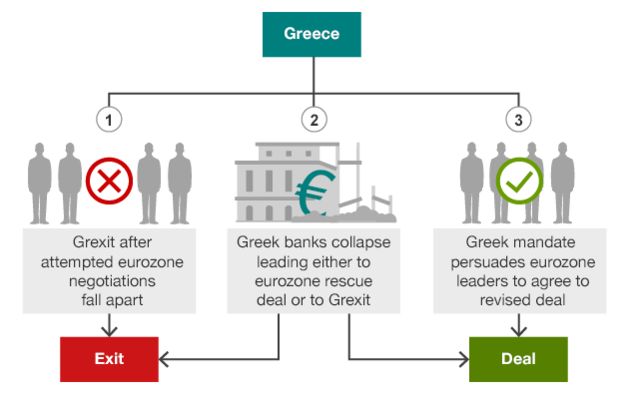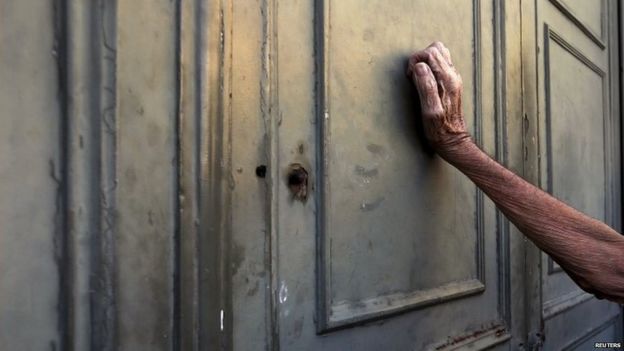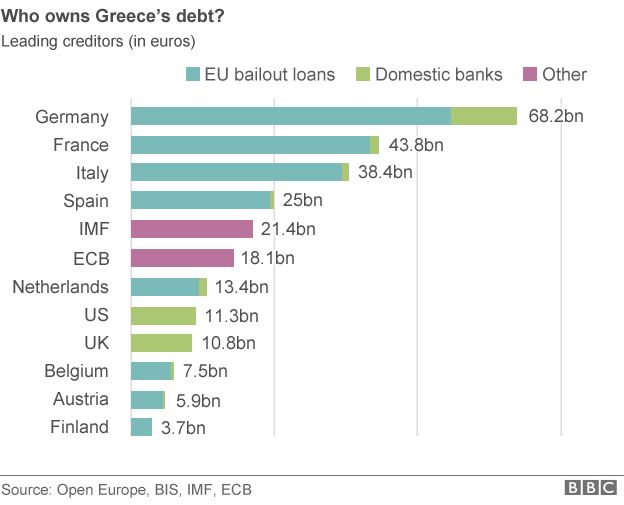Greek Prime Minister Alexis Tsipras has promised his government will submit “credible reform” proposals to its creditors on Thursday.
Mr Tsipras was speaking during a fractious debate on the Greek debt crisis in the European Parliament.
Greece is desperate for a third bailout to avoid bankruptcy and possibly crashing out of the euro currency.
Meanwhile, the Greek government has insisted that there is no threat to food and fuel supplies.
In a statement, the Ministry of Economy, Infrastructures, Maritime Affairs and Tourism “reassures both the Greek citizens and the visitors (tourists) that there are adequate food supplies in the market and that their prices remain stable”.
Lavish lifestyles on hold in Athens ‘Yes’ neighbourhood
European leaders have set Thursday as the deadline for serious reform plans from Greece in exchange for more aid.
An emergency summit involving all 28 European Union members – not just the 19 eurozone countries – will take place on Sunday.
Greece would “file new concrete proposals, credible reforms, for a fair and viable solution,” Mr Tsipras told MEPs.
Earlier, he urged Europe not to succumb to “division”.
Mixed reception
The left-wing leader was greeted by both boos and cheers as he entered the European Parliament, where he criticised previous bailouts for turning Greece into an “austerity laboratory”.
Mr Tsipras was speaking only days after the Greek people decisively rejected the latest proposals from creditors in a referendum.
The Greek people “stood up and were counted – we have to listen to what they said.”
Greece’s failure to come up with new proposals at a eurozone summit on Tuesday angered several European leaders, and some of that frustration was reflected in the European Parliament debate.
German MEP Manfred Weber accused Mr Tsipras of insulting other European leaders.
“The extremists of Europe are applauding you,” he said, referring to support from both left and right in parliament.
However, some MEPs displayed placards saying “No”, praising the result of the Greek referendum.
Lavish lifestyles on hold in Athens ‘Yes’ neighbourhood
Peston: A shockingly bleak assessment
Greek scenarios

Greece’s creditors – the European Commission, the European Central Bank (ECB) and the International Monetary Fund – have already provided more than €200bn in two bailouts since a rescue plan began five years ago.
Greece has meanwhile formally asked the European bailout facility – the European Stability Mechanism – for help.
Sources say Athens is requesting a fresh three-year loan in exchange for reforms.
In addition, the ECB’s governing council is discussing its emergency lending for Greek banks, though no change is thought likely before the weekend. Since last week, the ECB has refused to extend lending.
At the scene: Hugh Schofield, BBC News, Strasbourg

There was a softness in the tone of Alexis Tsipras which shows he knows how to appeal to an audience. For the first time he stated explicitly that the problems facing Greece are not just the fault of the evil creditors.
He said that for decades corruption and a “politico-economic nexus” had been given a free hand – and that his government was committed to ending that. He also reached out to other peoples “suffering under austerity” – a sign that he can see how it might hurt elsewhere in Europe for Greece to get special treatment.
But on specifics, there was nothing. Certainly none of the detail which is supposed to be put down on paper between now and Friday. Instead, backed by his referendum victory on Sunday, Mr Tsipras stood his ground. Any deal had to offer the prospects of growth, and it had to include discussion of Greek debt.
Does he actually have anything more to offer the eurozone? We still do not know.
EU Economy Commissioner Pierre Moscovici told the BBC’s Today programme that Europe wanted to stop Greece falling out of the euro.
“The Commission does not want a Grexit. Grexit would be a terrible failure and we are fighting to avoid it.”
But, first, he said proposals must come from the Greek side.
“They know what they have to do, they know what we expect”.
Crisis countdown

Greek pensioners have struggled to receive payments
- Thursday 9 July: deadline for Greece to submit proposals
- Saturday 11 July: eurozone finance ministers meet
- Sunday 12 July: all 28 members of the European Union meet to decide Greece’s fate
- Monday 20 July: €3bn payment due from Greece to the European Central Bank
Greece’s banks have been shut since its last international bailout programme expired on June 30th and it missed an IMF payment.
Capital controls mean people are unable to withdraw more than €60 (£43; $66) a day from cash machines.

BBC
 Q FM Africa's Modern Radio
Q FM Africa's Modern Radio